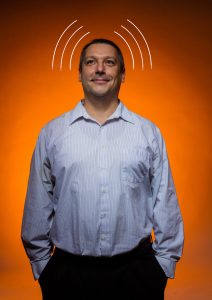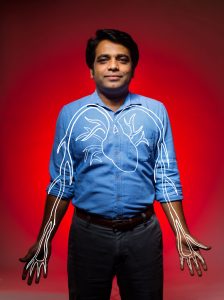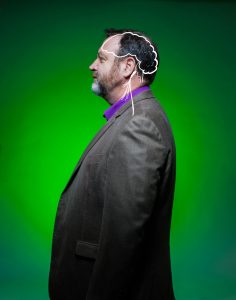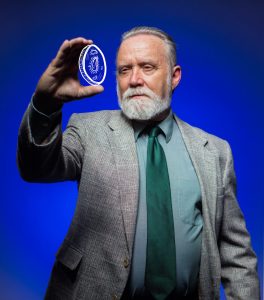Since its inception in 1909, Arkansas Tech University has been known as a teaching institution—a fundamental element of higher education. However, the role of undergraduate research is also vital to provide students with increased learning opportunities, especially at teaching institutions.
While state funding is essential to the success of ATU, external grants allow for enhanced scholarship for our students. Many of these experiences would be impossible without the additional funds sought out and managed by dedicated faculty and staff.
“The significance of external grants that ATU receives cannot be overstated,” said Greg Crouch, director of grants and sponsored programs. “Faculty at ATU that apply and receive such awards use them to enhance teaching practices for their students, providing them with opportunities they would not otherwise receive, such as conducting hands-on research and presenting at national conferences.”
Dr. Mariusz Gajewski, associate professor of chemistry at ATU, is the primary investigator (PI) for a National Institute of Health/IDeA Networks of Biomedical Research Excellence grant involving treatment of neuroinflammation. “All of us [faculty members] have been securing the external funding to improve research capabilities at ATU,” said Gajewski. “These grants are well beyond the internal ATU grants and allow us to accomplish much more with undergrads, who we believe need such experience.”
Another PI for a grant from the same organization is Dr. Rajib Choudhury, assistant professor of chemistry. Choudhury’s grant involves developing a new test to detect HSA (human serum albumin) in urine, which can indicate renal and cardiovascular health problems.
“The only way we move forward is by studying stuff,” said Dr. Rodney Roosevelt, associate professor of psychology, during a December 2018 interview. “The research dollars create opportunities, and research trickles down in so many ways.” Roosevelt is the PI for a grant from the National Institute of Health/IDeA Networks of Biomedical Research Excellence. The project tests the hypothesis that salivary alpha-amylase concentration is a reliable biomarker of the effect of transdermal vagus nerve stimulation (tVNS) in humans.
Other PIs for grants from the National Institute of Health/IDeA Networks of Biomedical Research Excellence include ATU faculty Dr. Newton Hilliard, associate professor of chemistry, and Dr. Turaj Ashuri, assistant professor of mechanical engineering.
According to Hilliard, “Students [benefitting from his grant] are involved in the investigation of the link between oxidation of sulfur-containing minerals as an energy source and carbon dioxide uptake and fixation by the marine bacteria Halothiobacillus neapolitanus.”
Ashuri’s grant project involves robotic hand design and construction. “People with disabilities comprise a significant portion of the community,” said Ashuri. “This places a significant burden on individuals, families and society. This research proposed the development of soft robotic hands, which will be of medical and economic benefit to all by providing important knowledge that can be used in [the] commercialization of the future human prosthetics.”
“Grant awards through the IDeA program are designed primarily with the idea (no pun intended) that they will be used by faculty for the purpose of strengthening the institution’s ability to provide high-quality, modern, hands-on training to students who will form the next generation of research scientists and/or medical professionals,” continued Hilliard. “This is exactly what ATU faculty have done over the past few years. Funds obtained through this program have been utilized to upgrade scientific instrumentation in both research core facilities and teaching classrooms. Several STEM courses have been converted from traditional lecture-based courses into Course-based Undergraduate Research Experience (CURE) courses. Upcoming funding in 2020 will see the partial renovation of two teaching/research dual-use laboratories.”
Students in classes that are served by external grants at ATU are doing more than just studying for an upcoming exam. They are learning how to research to gain practical experience for future careers.
“The scientific community places increasing importance on students’ research and this project provided an opportunity for the students to learn the state-of-the-art techniques in soft robotics design, fabrication and controls,” said Ashuri “[My] students fabricated the first prototype of a soft robotic hand that is capable of grasping objects. Further research is underway to enable the hand [to interact] with objects using advanced machine learning and artificial intelligence techniques.”
In addition to building their resumes, some students are paid for their research work. These on-campus jobs supplement funds that students may already receive from scholarships.
“I recently received a grant to conduct quail counts on Arkansas Game and Fish Commission wildlife management areas, said Dr. Chris Kellner, professor of wildlife science and PI for a grant from the Arkansas Game and Fish Commission. “The money [was] used to pay four students to conduct the counts during October and early November of 2019. The data that are collected will allow the Arkansas Game and Fish Commission to evaluate their efforts to restore quail habitat. More importantly, the students will gain valuable experience in conducting quail counts. That experience will make them more competitive in the job market and may also help prepare them to move on toward a graduate degree.”




